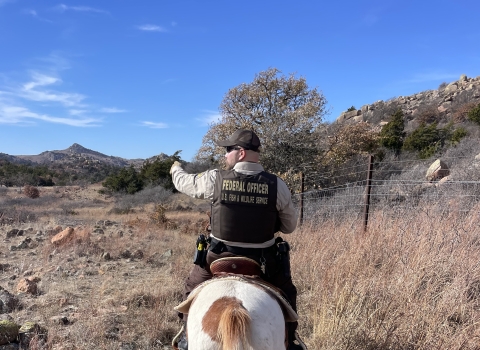Four men have been arrested by special agents of the U.S. Fish and Wildlife Service as the result of an undercover investigation into the illegal killing and trade of bald and golden eagles and other protected birds, as well as their feathers and parts, the Justice Department and the Fish and Wildlife Service announced today. The men are charged with alleged violations of the Bald and Golden Eagle Protection Act, the Migratory Bird Treaty Act, and the Lacey Act.
Arrested were Ricky Sam Wahchumwah, of Granger, Washington, Alfred L. Hawk Jr., of White Swan, Washington, William Wahsise, also of White Swan, Washington, and Reginald Dale Akeen, also known as J.J. Lonelodge, of Anadarko, Oklahoma.
The charging documents allege that the individuals were involved in killing eagles and selling feathers and other bird parts in violation of federal law.
According to an affidavit filed along with the complaints, special agents working undercover were able to document the sales of protected migratory bird parts. One complaint alleges that a single covert purchase from Hawk Jr. yielded a bald eagle tail, two golden eagle tails, one set of golden eagle wings, four red-shafted northern flicker tails, four rough-legged hawk tails, and two northern harrier tails for a total of $3,000. According to the documents, Hawk, Jr. and Wahsise allegedly hunted and killed three bald eagles the morning of the sale, by sitting near some wild horses killed to bait and attract eagles. A third complaint alleges that Wahchumwah sold one golden eagle tail in violation of the law. The sworn affidavit accompanying the complaint states that Wahchumwah sold the tail to an undercover special agent for $500.
A fourth complaint, filed in the District of Oregon, alleges that Akeen made several sales to an undercover agent, including two fans made from juvenile golden eagle feathers worth over $3,000.
"As with so many instances regarding the conservation and use of our natural resources, the illegal actions of a few selfish individuals have the potential to hurt the interests of the majority of people who respect the resource," said Paul Chang, Special Agent in Charge of Law Enforcement for the Services Pacific Region. "It is alarming that eagles, sacred to many, could be at risk because of the illegal greed-driven actions of relatively few individuals."
For example, a recent survey of 129 historic golden eagle nesting sites in Washington revealed that only 48 are currently occupied. Of those, only half are producing young.
Eagles and other protected migratory birds are viewed as sacred in many Native American cultures and the feathers of the birds are central to religious and spiritual Native American customs. By law, enrolled members of federally recognized Native American tribes are entitled to obtain permits to possess eagle parts for religious purposes but federal law strictly prohibits the sale of eagles or their feathers and parts under any circumstance. The Fish and Wildlife Service operates the National Eagle Repository, which collects eagles that die naturally, by accident or other means to supply enrolled members of federally recognized tribes with eagle parts for religious use. The Service has worked to increase the number of salvaged eagles sent to the Repository and make it easier to send birds to the facility by providing shipping materials at no charge. The Repository obtains eagles from state and federal agencies as well as zoos.
The agency encourages anyone who finds an eagle carcass or eagle feathers or other parts to contact a Fish and Wildlife Service law enforcement office (see http://www.fws.gov/le/ContactsSites/le_chart.htm ).
The U.S. Fish and Wildlife Service is the principal federal agency responsible for conserving, protecting and enhancing fish, wildlife and plants and their habitats for the continuing benefit of the American people. The arrests announced today are part of an on-going investigation into the illegal killing of bald and golden eagles and other protected birds and the sale of their feathers and parts. The agency is conducting the investigation with the help and cooperation of state, federal and tribal law enforcement agencies.
The cases will be prosecuted by the U.S. Attorneys Offices of the Eastern District of Washington, the District of Oregon, and the Justice Departments Environmental Crimes Section. The maximum penalty per violation of the MBTA is two years imprisonment and a $250,000 fine; per violation of the Bald and Golden Eagle Act is one year imprisonment and a $250,000 fine for a first offense; and per violation of the Lacey Act is five years imprisonment and a $250,000 fine. The charges and allegations contained in the complaints are merely accusations and the defendants are presumed innocent unless and until proven guilty.
For photos, video and more information on bald and golden eagles go to http://www.fws.gov/pacific/lawenforcement/eaglelaws/


